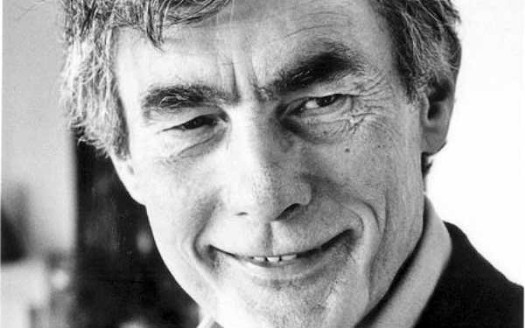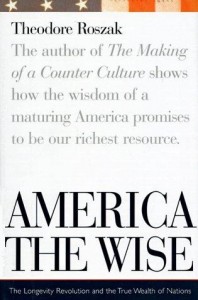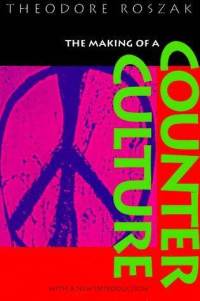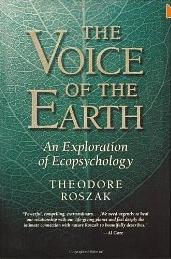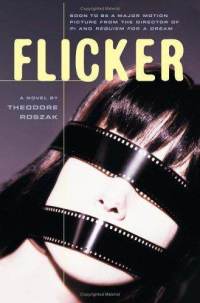Fuse Remembrance: Theodore Roszak (1933–2011)
“The main idea I’ve been working with is what I call the longevity revolution.” —Theodore Roszak
By Harvey Blume.
Theodore Roszak died this July 5 at age 77. His book The Making of a Counter Culture: Reflections on the Technocratic Society and its Youthful Opposition appeared in 1969, just after the Woodstock Festival, which he attended, and while opposition to the War in Vietnam was spreading on campuses and off. The Making of a Counter Culture captured boomer energy and idealism at their height.
His later book, America the Wise: the Longevity Revolution and the True Wealth of Nations (1998), maintained that boomers would transform the culture of aging no less than they had youth culture. When I interviewed him (for the Boston Book Review) he said, “The baby boom has had two great historical opportunities. One was being young in the ’60s. The other is aging. It’s a generation that’s had the opportunity to redefine our national identity twice.”
Given the current impasse over America’s spending priorities—health care, chief among them—it would be foolish to claim that Roszak’s optimistic forecast has been borne out. But it would be equally naive to think the impetus for the social changes he predicted has been exhausted.
Theodore Roszak is author of The Making of the Counter-culture, a study of baby boomers in the sixties. His book, America the Wise: the Longevity Revolution and the True Wealth of Nations, discusses the implications, for themselves and for society as a whole, of the baby boom generation nearing old age.
Theodore Roszak: The Inner Elder
We are the first generation of the senior dominance. The beneficiaries of a revolution in life-extending medicine and public health, we enter the second half of our lives possessed of more political influence, greater wealth, and more vitality than any older generation before us. The values we choose to live by cannot help but be a commanding influence in shaping the century to come.
Think of those years as a resource—a cultural and spiritual resource reclaimed from death in the same way the Dutch reclaim fertile land from the waste of the sea.
But how shall those years be spent?
From America the Wise: the Longevity Revolution and the True Wealth of Nations
Harvey Blume: How old are you?
Theodore Roszak: I’m 65.
HB: When did boomers begin to interest you?
TR: I wrote The Making of a Counterculture in 1968 as a series of articles for the Nation. I was writing, as a young academic, primarily about my own students. From there I became drawn politically and personally to the protest movement.
HB: Can you say a word about how the sixties affected older people?
TR: The parental generation was often targeted in a way that didn’t take into account why members of that generation wanted stability and security. They’d been through 12 years of Depression and four years of war. They wanted stability and security at last—and that was the very thing their children held against them. They were caught in a terrible bind.
HB: I remember Vladimir Nabokov saying, apropos of boomers in the sixties, that only old people could truly be revolutionaries. I resented that at the time but it stayed with me, and I thought of it again when reading America the Wise. You talk about a reorientation of society brought about by a senior generation.
TR: The main idea I’ve been working with is what I call the longevity revolution. It’s a revolution in the same sense that industrialism was a revolution, and it’s predicated on industrialism. There’s always been utopian speculation about the goal of an industrial society. The goal is turning out to be a longer, healthier life, especially in societies where there are more old people than young people.
HB: How does longevity tie in to the industrial revolution?
TR: The phrase “industrial revolution” was invented in the Victorian period by an historian named Arnold Toynbee, the uncle of the twentieth-century’s Arnold Toynbee. Toynbee was one of the first psychiatric social workers, and in a series of lectures at Oxford in the 1880s, he defined the phrase industrial revolution as it’s been used ever since. He focused on the nineteenth-century population boom and its intersection with the market place. He put those two together and called it the industrial revolution. By the end of the nineteen-century, it was clear industrialism was contributing to a longer life expectancy than anyone ever experienced before.
HB: Why? Better hygiene, better medicine?
TR: The major contribution that industrialism made to longevity was simply bringing death and disease to a sharp focus. Prior to that, people in villages and on farms lived in squalor and often died in childbirth; they knew they would not live very long and could be carried away by any plague that came along. Once you had moved millions of people into industrial cities, it was if you had a magnifying glass trained upon the condition.
The great public health campaigns grew out of that. Cleaning up the world made more of a difference than medical breakthroughs in the nineteenth-century. Today, cleaning up the water supply and getting rid of garbage and sewage has simply become what is expected of a prospering industrial economy. The twentieth century added major medical breakthroughs, and now, at its end, we’re adding bio-technology, which promises a life expectancy of a 100 or more.
Today, though, there’s a new wrinkle, the shrinking size of families. It’s difficult for Americans to recognize this; we are still so much under the spell of the baby boom generation that we don’t realize how freakish it was. It was the one time in modern industrial society when fertility rate increased and, for a 20 year period, population shifted toward youth.
The baby boom was an anomaly. It will never happen again. I say that with great confidence because nobody can remotely imagine that women in industrial society are going to agree to have four or five children. Without that happening, as it did in the baby boom, you can’t have a baby boom. You can’t reproduce that phenomenon in societies where women seek careers, education, and equal opportunity.
The long-term trend is toward lengthening life expectancy and decreasing fertility. It’s already been registered in many European societies—even Catholic societies like Italy and Spain—as what’s called the “birth dearth”. The fertility rate falls below the replacement rate. That’s also the case with the Japanese, who are the wave of the future so far as longevity goes. They are the oldest society in history with an average age of over 40.
HB: So boomers are part of a longevity trend but also unique within that trend.
TR: The baby boom has had two great historical opportunities. One was being young in the ’60s. The other is aging. It’s a generation that’s had the opportunity to redefine our national identity twice.
HB: You talk about health care not as a drain on the economy but as a society’s ultimate goal.
TR: Through the mid-twentieth century and the early years of the baby boom generation, we referred to our society as the automotive society. Most of our national wealth was concentrated in gas guzzlers. The health of the economy was measured by how many automobiles we produced. This was characteristic of a young, highly mobile society. But there’s no god-given rule that says a society must be an automotive society. In the twenty-first century, we will become a health care economy, simply because we will have an enormous amount of people taking advantage of opportunities in health care. Health care will be a basis for employment. We’re simply not used to the idea. We’ll become used to it in the twenty-first century because we won’t have any choice.
HB: Either that or we’re going to have a lot of old people with no health care. Right now, looking at this society, I’m not sure which way it’s going to go.
TR: We’ll have to get used to the role of the senior generation. In times past, it was sensible to ask, what are we going to do with them? But in the twenty-first century, they will be the dominant part of the population. They will be looking out for their own interest and that interest will be a longer, healthier life. They’re not going to ask anybody’s permission; they’re going to vote for it. The market place and the political process will respond.
HB: Isn’t it possible this senior generation will vote instead to hold on to whatever wealth they’ve managed to acquire, as in resisting property taxes?
TR: They may indeed do that. Why shouldn’t they? Is there any rule that people in their 20s and 30s should make the decisions?
HB: If there is any such rule, it was probably introduced by boomers in the first place. You’re saying boomers will now reverse themselves and bring about an accent on aging.
TR: There’s no question but that people will respond to demands for medical care and a long healthy life. Longevity isn’t a terrible liability; it’s a benefit that, like all benefits, has costs attached. We choose the benefits we feel are worth paying for. Long life and good health are obviously things we value and will pay for. No politician is going to run on a platform that calls for decreasing life expectancy.
HB: But if you attack social security and Medicare aren’t you in effect saying the same thing: you’re old; you aren’t rich; please disappear?
TR: By the time the baby boomer generation has reached its senior years, it will have the voting strength to simply dismiss ideas like that.
HB: Boomers make lots of noise. The sixties were a period of turmoil, obviously. Do you see comparable forms of political organization among the elderly?
TR: That will happen over the next 10 to 20 years as more and more boomers move into their sixties. They’re going to be healthy, well educated, and they’re going to have political savvy. Once they reach retirement they are going to become much more active about issues.
HB: In the sixties, there were college campuses to bring us together. Seniors don’t have any comparable institutions.
TR: True, but there’s a remarkable parallel between being retired and being at school. One of the criticisms made of the protest movement in the sixties was that participants were in privileged situation; they didn’t have to worry about jobs or families. They were in school with plenty of time to cogitate and criticize. The fact is retirement is a lot like that, too.
At one level, I’m predicting demographic changes. At another, I’m advocating political choices. I would rather see the senior generation turn in the direction of the Gray Panthers than in the direction of the American Association of Retired Persons. The AARP is a consumption related group that doesn’t really have a political program. It’s organized primarily to sell insurance and to organize pleasure cruises. My hope is that as the baby boom generation moves into its senior years, it will want to belong to organizations that have much more political substance than that.
HB: People who came after boomers tend to resent us. They’re tired of hearing about boomer politics, boomer music, boomer sturm und drang. They’re sick of the sixties.
TR: I’m aware of that. One of the things I did while writing “America the Wise” was pay attention to Internet news groups organized by teens and 20 somethings. There as a tremendous amount of that resentment there. What you can say about this? It is simply the demographic and political fact that the baby boom generation was and is a big one and that it carries certain interests with it.
One thing to bear in mind is that the interests of senior people in health care and security are universal interests. Everybody does get older. The deal we give to senior citizens today is the deal we get in about 20 years. Twenty-somethings are apt not to be looking that far ahead.
HB: Your book helped me think about aging as something other than a purely individual affair. But it seems your view is in the minority; most books on the subject treat longevity as a catastrophe.
TR: That’s the main reason I wrote “America the Wise.” I found myself puzzled and angry at the analysis of aging that could only interpret it as somehow unnatural or disastrous, whereas, in fact, it represents a triumph, one of the best things to come from the long and strenuous industrial experiment.
The other dumb thing about this analysis is the assumption that age groups are like gender groups or groups antagonistically defined by ethnicity. But every young person, whether they know it or not, has age in their destiny. It’s not about rich and poor, male and female; we’re talking about the life process itself. People are going to spend more time being older than younger.
HB: You make an interesting connection between child-centeredness and victim consciousness. You say the focus on childhood and youth is behind the sense of victimhood so pervasive in this society.
TR: In the baby boom period, there was tremendous emphasis on a child oriented society; it was the period of the inner child. In the years ahead, we’re going to recognize that life moves on. It’s time to discover the inner elder. Psychotherapy is going to be oriented toward problems of age, including diseases, sickness and death. Those are going to emerge as greater challenges than the challenges of childhood.
HB: Why do you have such a low opinion of Internet’s effect on the elderly?
TR: High-tech industry spreads the hype that children are born knowing much more about computers than their parents. I wanted to expose that. Advertising creates the absurd impression that older people are not to be taken seriously—except about being old.
HB: So why not say to elders, get with it, cyberspace isn’t owned by young people, it’s controlled by whoever shapes it?
TR: That’s the fact. But the imagery makes it seem otherwise. So many stories in the press insist that computers are for the young, that elders are too stodgy.
HB: Would you agree that there’s an element of utopianism to your way of thinking, as in the language you use? For example, you talk about aging boomers as the New People.
TR: I couldn’t imagine writing a book that was simply negative and gloomy about aging. I’m trying to interpret what we are up against in the most positive way. There have been people, like Lester Thurow, who have seriously suggested that the senior generation might have to give up on health care. When I read things like that I say to myself this is exactly wrong; allocating more and more of our resources for health care and economic security is to the benefit of everybody. It’s a benign use of our resources.
HB: You advocate both the right to health care and the right to die. You write, “If people cling to life desperately, irrationally, out of fear or panic, who has the right to tear that life away from them? If people wish to cast their lives away, again irrationally, out of despair or fear or unbearable pain, who has the right to force that life upon them?”
So suicide is viable, so long as lack of health care doesn’t drive people to it.
TR: I don’t doubt that we’re going to have an active discussion of death in the next generation. It’s already begun. The day is over when people thought of death in the context of not living very long. In the past, many people met their death in their 40s and 50s; that was often tragic. But we’re talking about a future with an enormous number of people living into their eighties. In that context, death takes on a very different characteristic; to live on with great disabilities may be a greater evil than leaving life behind. But only in a society with that kind of longevity can such a discussion become meaningful.

